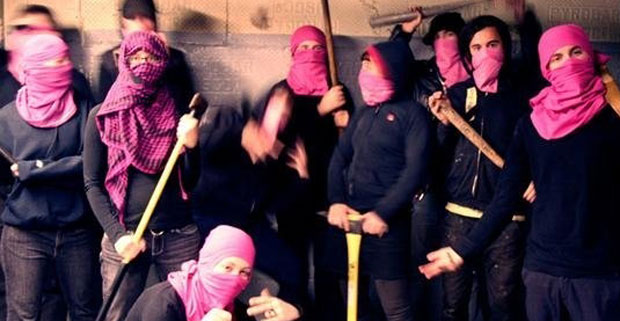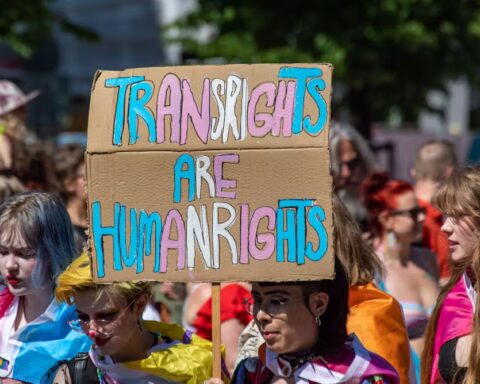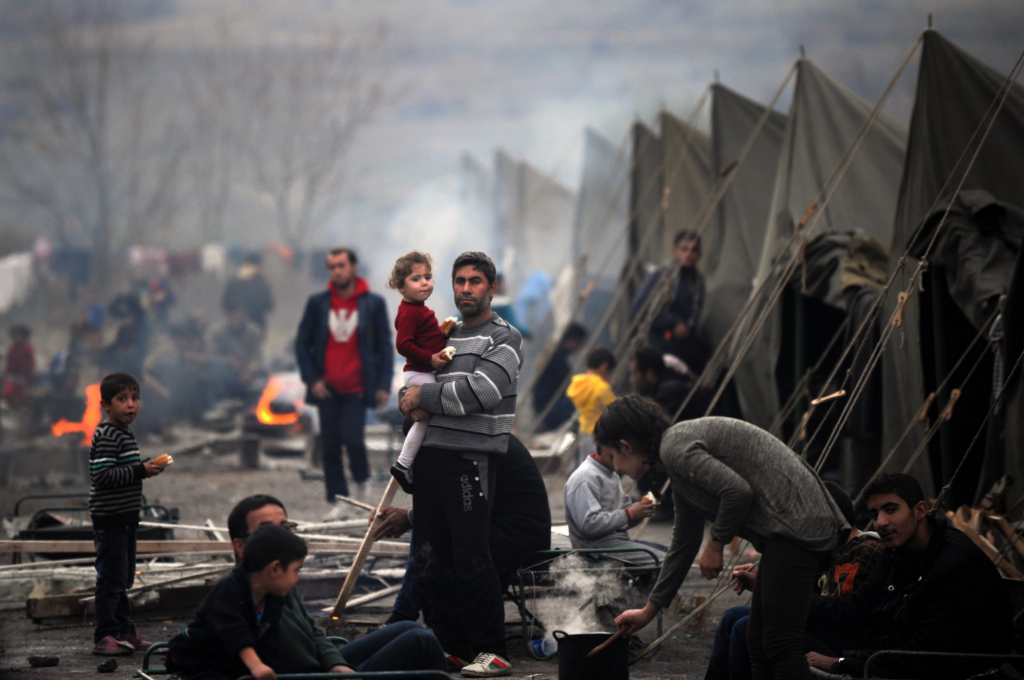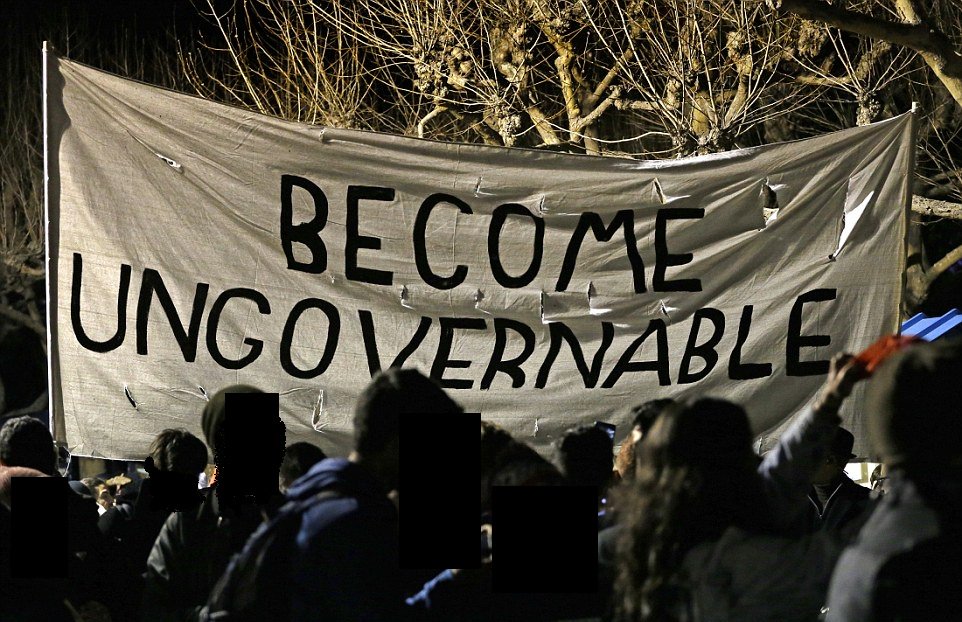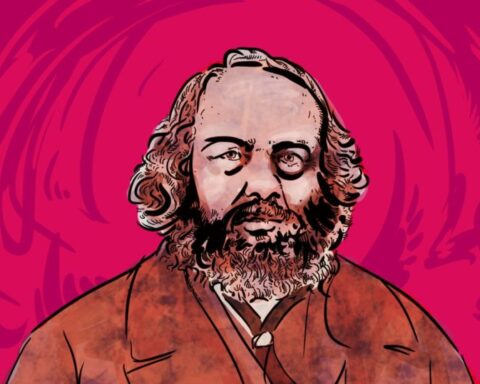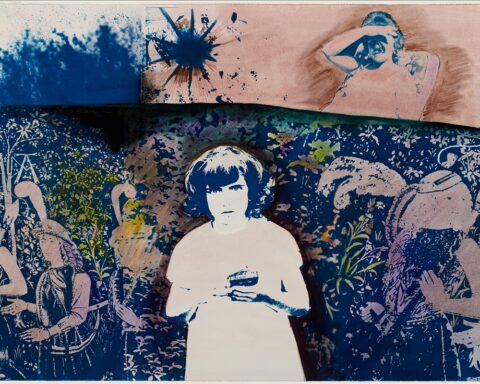I
Some will read “queer” as synonymous with “gay and lesbian” or “LGBT”. This reading falls short. While those who would fit within the constructions of “L”, “G”, “B” or “T” could fall within the discursive limits of queer, queer is not a stable area to inhabit. Queer is not merely another identity that can be tacked onto a list of neat social categories, nor the quantitative sum of our identities. Rather, it is the qualitative position of opposition to presentations of stability – an identity that problematizes the manageable limits of identity. Queer is a territory of tension, defined against the dominant narrative of white hetero monogamous patriarchy, but also by an affinity with all who are marginalized, otherized and oppressed. Queer is the abnormal, the strange, the dangerous. Queer involves our sexuality and our gender, but so much more. It is our desire and fantasies and more still. Queer is the cohesion of everything in conflict with the heterosexual capitalist world. Queer is a total rejection of the regime of the Normal.
II
As queers we understand Normalcy. Normal, is the tyranny of our condition; reproduced in all of our relationships. Normalcy is violently reiterated in every minute of every day. We understand this Normalcy as the Totality. The Totality being the interconnection and overlapping of all oppression and misery. The Totality is the state. It is capitalism. It is civilization and empire. The totality is fence post crucifixion. It is rape and murder at the hands of police. It is “Str8 Acting” and “No Fatties or Femmes”. It is Queer Eye for the Straight Guy. It is the brutal lessons taught to those who can’t achieve Normal. It is every way we’ve limited ourselves or learned to hate our bodies. We understand Normalcy all too well.
III
When we speak of social war, we do so because purist class analysis is not enough for us. What does a marxist economic worldview mean to a survivor of bashing? To a sex worker? To a homeless, teenage runaway? How can class analysis, alone as paradigm for a revolution, promise liberation to those of us journeying beyond our assigned genders and sexualities? The Proletariat as revolutionary subject marginalizes all whose lives don’t fit in the model of heterosexual-worker. Lenin and Marx have never fucked the ways we have. We need something a bit more thorough something equipped to come with teethgnashing to all the intricacies of our misery. Simply put, we want to make ruins of domination in all of its varied and interlacing forms. This struggle inhabiting every social relationship is what we know as social war. It is both the process and the condition of a conflict with this totality.
IV
In the discourse of queer, we are talking about a space of struggle against this totality – against normalcy. By “queer”, we mean “social war”. And when we speak of queer as a conflict with all domination, we mean it
V
See, we’ve always been the other, the alien, the criminal. The story of queers in this civilization has always been the narrative of the sexual deviant, the constitutional psychopathic inferior, the traitor, the freak, the moral imbecile. We’ve been excluded at the border, from labor, from familial ties. We’ve been forced into concentration camps, into sex slavery, into prisons. The normal, the straight, the american family has always constructed itself in opposition to the queer.
Straight is not queer. White is not of color. Healthy does not have HIV. Man is not woman. The discourses of heterosexuality, whiteness and capitalism reproduce themselves into a model of power. For the rest of us, there is death. In his work, Jean Genet [1] asserts that the life of a queer, is one of exile that all of the totality of this world is constructed to marginalize and exploit us. He posits the queer as the criminal. He glorifies homosexuality [2] and criminality as the most beautiful and lovely forms of conflict with the bourgeois world. He writes of the secret worlds of rebellion and joy inhabited by criminals and queers.
Quoth Genet,
“Excluded by my birth and tastes from the social order, I was not aware of its diversity. Nothing in the world was irrelevant: the stars on a general’s sleeve, the stock-market quotations, the olive harvest, the style of the judiciary, the wheat exchange, flower beds. Nothing. This order, fearful and feared, whose details were all interrelated, had a meaning: my exile.”
VI
A fag is bashed because his gender presentation is far too femme. A poor transman can’t afford his life-saving hormones. A sex worker is murdered by their client. A genderqueer persyn is raped because ze just needed to be “fucked straight”. Four black lesbians are sent to prison for daring to defend themselves against a straight-male attacker. [3] Cops beat us on the streets and our bodies are being destroyed by pharmaceutical companies because we can’t give them a dime. Queers experience, directly with our bodies, the violence and domination of this world. Class, Race, Gender, Sexuality, Ability; while often these interrelated and overlapping categories of oppression are lost to abstraction, queers are forced to physically understand each. We’ve had our bodies and desires stolen from us, mutilated and sold back to us as a model of living we can never embody.
Foucault says that
“power must be understood in the first instance as the multiplicity of force relations immanent in the sphere in which they operate and which constitute their own organization; as the processes which, through ceaseless struggles and confrontations, transforms, strengthens or reverses them; as the support which these force relations find in one another, thus forming a chain or system, or on the contrary, the disjunctions and contradictions which isolate them from one another; and lastly, as the strategies in which they take effect, whose general design or institutional crystallization is embodied in the state apparatus, in the formulation of the law, in the various social hegemonies.”
We experience the complexity of domination and social control amplified through heterosexuality. When police kill us, we want them dead in turn. When prisons entrap our bodies and rape us because our genders aren’t similarly contained, of course we want fire to them all. When borders are erected to construct a national identity absent of people of color and queers, we see only one solution: every nation and border reduced to rubble.
VII
The perspective of queers within the heteronormative world is a lens through which we can critique and attack the apparatus of capitalism. We can analyze the ways in which Medicine, the Prison System, the Church, the State, Marriage, the Media, Borders, the Military and Police are used to control and destroy us. More importantly, we can use these cases to articulate a cohesive criticism of every way that we are alienated and dominated.
Cooper’s Donuts was an all night donut shop on a seedy stretch of Main Street in Los Angeles. It was a regular hangout for street queens and queer hustlers at all hours of the night. Police harassment was a regular fixture of the Cooper’s, but one May night in 1959, the queers fought back. What started with customers throwing donuts at the police escalated into full-on street fighting. In the ensuing chaos, all of the donut-wielding rebels escaped into the night.
Queer is a position from which to attack the normative more, a position from which to understand and attack the ways in which normal is reproduced and reiterated. In destabilizing and problematizing normalcy, we can destabilize and become a problem for the Totality.
The history of organized queers was borne out of this position. The most marginalized transfolk, people of color, sex workers – have always been the catalysts for riotous explosions of queer resistance. These explosions have been coupled with a radical analysis wholeheartedly asserting that the liberation for queer people is intrinsically tied to the annihilation of capitalism and the state. It is no wonder, then, that the first people to publicly speak of sexual liberation in this country were anarchists, or that those in the last century who struggled for queer liberation also simultaneously struggled against capitalism, racism and patriarchy and empire. This is our history.
VIII
If history proves anything, it is that capitalism has a treacherous recuperative tendency to pacify radical social movements. It works rather simply, actually. A group gains privilege and power within a movement, and shortly thereafter sell their comrades out. Within a couple years of stonewall, affluent gay white males had thoroughly marginalized everyone that had made their movement possible and abandoned their revolution with them. It was once that to be queer was to be in direct conflict with the forces of control and domination. Now, we are faced with a condition of utter stagnation and sterility. As always, Capital recuperated brick-throwing street queens into suited politicians and activists. There are logcabin Republicans and “stonewall” refers to gay Democrats. There are gay energy drinks and a “queer” television station that wages war on the minds, bodies and esteem of impressionable youth.
The “LGBT” political establishment has become a force of assimilation, gentrification, capital and statepower. Gay identity has become both a marketable commodity and a device of withdrawal from struggle against domination. Now they don’t critique marriage, military or the state. Rather we have campaigns for queer assimilation into each. Their politics is advocacy for such grievous institutions, rather than the annihilation of them all. “Gays can kill poor people around the world as well as straight people!” “Gays can hold the reigns of the state and capital as well straight people!” “We are just like you”. Assimilationists want nothing less than to construct the homosexual as normal – white, monogamous, wealthy, 2.5 children, SUVs with a white picket fence. This construction, of course, reproduces the stability of heterosexuality, whiteness, patriarchy, the gender binary, and capitalism itself.
One weekend in August of 1966 – Compton’s, a twenty four hour cafeteria in San Francisco’s Tenderloin neighborhood was buzzing with its usual late-night crowd of drag queens, hustlers, slummers, cruisers, runaway teens and neighborhood regulars. The restaurant’s management became annoyed by a noisy young crowd of queens at one table who seemed to be spending a lot of time without spending a lot of money, and it called the police to roust them. A surly police officer, accustomed to manhandling Compton’s clientele with impunity, grabbed the arm of one of the queens and tried to drag her away. She unexpected threw her coffee in his face, however, and a melee erupted: Plates, trays, cups and silverware flew through the air at the startled police who ran outside and called for backup. The customer’s turned over the tables, smashed the plate-glass windows and poured onto the streets. When the police reinforcements arrived, street fighting broke out all throughout the Compton’s vicinity. Drag queens beat the police with their heavy purses and kicked them with their high-heeled shoes. A police car was vandalized, a newspaper box was burnt to the ground and general havoc was raised all throughout the Tenderloin.
If we genuinely want to make ruins of this totality, we need to make a break. We don’t need inclusion into marriage, the military and the state. We need to end them. No more gay politicians, CEOs and cops. We need to swiftly and immediately articulate a wide gulf between the politics of assimilation and the struggle for liberation.
We need to rediscover our riotous inheritance as queer anarchists. We need to destroy constructions of normalcy, and create instead a position based in our alienation from this normalcy, and one capable of dismantling it. We must use these positions to instigate breaks, not just from the assimilationist mainstream, but from capitalism itself. These positions can become tools of a social force ready to create a complete rupture with this world. Our bodies have been born into conflict with this social order. We need to deepen that conflict and make it spread.
What began as an early morning raid on June 28th 1969 at New York’s Stonewall Inn, escalated to four days of rioting throughout Greenwich Village. Police conducted the raid as usual; targeting people of color, transpeople and gender variants for harassment and violence. It all changed, though, when a bull-dyke resisted her arrest and several street queens began throwing bottles and rocks at the police. The police began beating folks, but soon people from all over the neighborhood rushed to the scene, swelling the rioters numbers to over 2,000. The vastly outnumbered police barricaded themselves inside the bar, while an uprooted parking meter was used as a battering ram by the crowd. Molotov cocktails were thrown at the bar. Riot police arrived on scene, but were unable to regain control of the situation. Drag queens danced a conga line and sang songs amidst the street fighting to mock the inability of the police to re-establish order. The rioting continued until dawn, only to be picked up again at nightfall of the subsequent days.
IX
Susan Stryker writes that the state acts to
“regulate bodies, in ways both great and small, by enmeshing them within norms and expectations that determine what kinds of lives are deemed livable or useful and by shutting down the space of possibility and imaginative transformation where peoples’ lives begin to exceed and escape the state’s use for them.”
We must create space wherein it is possible for desire to flourish. This space, of course, requires conflict with this social order. To desire, in a world structured to confine desire, is a tension we live daily. We must understand this tension so that we can become powerful through it – we must understand it so that it can tear our confinement apart.
On the night of May 21st 1979, in what has come to be known as the White Night Riots, the queer community of San Francisco was outraged and wanted justice for the murder of Harvey Milk. The outraged queers went to city hall where they smashed the windows and glass door of the building. The riotous crowd took to the streets, disrupting traffic, smashing storefronts and car windows, disabling buses and setting twelve San Francisco Police cruisers on fire. The rioting spread throughout the city as others joined in on the fun!
This terrain, born in rupture, must challenge oppression in its entirety. This of course, means total negation of this world. We must become bodies in revolt. We need to delve into and indulge in power. We can learn the strength of our bodies in struggle for space for our desires. In desire we’ll find the power to destroy not only what destroys us, but also those who aspire to turn us into a gay mimicry of that which destroys us. We must be in conflict with regimes of the normal. This means to be at war with everything. If we desire a world without restraint, we must tear this one to the ground. We must live beyond measure and love and desire in ways most devastating. We must come to understand the feeling of social war. We can learn to be a threat, we can become the queerest of insurrections.
X
To be clear: We’ve despaired that we could never be as well-dressed or cultured as the Fab Five. We found nothing in Brokeback Mountain. We’ve spent far too long shuffling through hallways with heads hung low. We don’t give a shit about marriage or the military. But oh we’ve had the hottest sex everywhere in all the ways we aren’t supposed to and the other boys at school definitely can’t know about it.
In 1970, Stonewall veterans, Marsha P. Johnson and Sylvia Rivera founded STAR Street Transvestite Action Revolutionaries. They opened the STAR house, a radical version of the “house” culture of black and latina queer communities. The house provided a safe and free place for queer and trans street kids to stay.
Marsha and Sylvia as the “House Mothers” hustled to pay rent so that the kids would not be forced to. Their “children” scavenged and stole food so that everyone in the house could eat. That’s what we call mutual aid! In the time between the Stonewall Riots and the outbreak of HIV, the queer community of New York saw the rise of a culture of public sex. Queers had orgies in squatted buildings, in abandoned semi-trucks, on the piers and in bars and clubs all along Christopher street. This is our idea of voluntary association of free individuals! Many mark this as the most sexually liberated time this country has ever seen. Though, the authors of this zine wholeheartedly believe we can outdo them.
And when I was sixteen a would be bully pushed me and called me a faggot. I hit him in the mouth. The intercourse of my fist and his face was far sexier and more liberating than anything MTV ever offered our generation. With the pre cum of desire on my lips I knew from then on that I was an anarchist. In short, this world has never been enough for us. We say to it, “we want everything, motherfucker, try to stop us!”
let’s get decadent!
filth is our politics!
filth is our life!
_________________________________________________
text by Mary Nardini Gang
[1] Jean Genet was a queer, criminal, vagabond who spent his early life traveling around Europe leaving a trail of sordid affairs in his wake. He was sentenced to life in prison after nearly a dozen arrests for theft, prostitution, vagrancy and lewd behavior. While in prison he took up writing and inspired Sarte and Picasso to petition the French government for his release. After his release, he was drafted into the military, only to be released for fucking fellow soldiers. The remainder of his life was marked by flirtations with various revolutionaries, philosophers, uprisings and intifadas. Genet’s life is a beautiful example of revolutionary criminal queer decadence.
[2] “homosexuality” used only as Genet uses it. When speaking of queers, we mean infinitely more.
[3] See the New Jersey 4. And let’s free everyone else while we’re at it.
